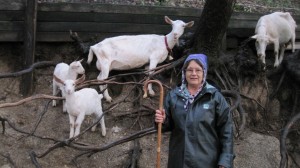Organic farming experience offers cautionary tale
May 23, 2012
907-474-5042
5/22/12
Ginger Meta left Fairbanks a year ago with high hopes for the World Wide Opportunities on Organic Farms program she had joined. She intended to learn about farming by working and staying on farms in Hawaii and Washington.
Now that all is said and done, Meta has a cautionary tale for people who envision this type of program offering them a way to learn organic farming techniques in exchange for room and board.

“After what I have seen and experienced, I feel there should be more discussion about the darker side of these programs,” Meta wrote in an email.
“The idea of living off the land is…more of a romantic fantasy than a working reality,” Meta wrote. “I would say that of the seven farms and ranches that I visited over the last 14 months, only three managed to do a pretty good job of making the farming support them. Too many of these people for whom I worked were over their heads. Their dreams of self-sufficiency by going back to the land were turning into a nightmare of debt, work overload and exhaustion.”
A big problem, in Meta’s opinion, was that the farmers couldn’t afford professional farm help and instead relied on volunteers through WWOOF to do the work.
“A WWOOF applicant has to be careful lest they get sucked into working themselves to the bone for someone,” Meta said. “The attitude and the ethics of the people involved, whether they treated their WWOOFers like people or like slaves, was a lot of what made or broke the experience.”
Her favorite WWOOF hosts were Patricia Tukey of the Good Shepherd Farm in Wenatchee, Wash., and Peter Angelsea and Minka Nelson of the Honomuni Farm in Hawaii.
“Peter and Minka had a tiny farm, only half an acre total. I worked for them and they showed me all that they had done to achieve a more self-sufficient lifestyle. They were tapping a nearby stream for drinking and irrigation water. They powered their fridge and a few lights with solar panels. They networked with their neighbors to get food that they didn’t grow. They headed up a neighborhood recycling effort and Peter was able to glean some good building materials. They welcomed me into their family and appreciated my hard work, but never did I feel like I was just a drudge.
“Patricia Tukey was also fair and kind. She took me in after I left a ranch where I was being taken advantage of (working ten hour days seven days a week). She only asked me to do 30 hours a week. She made teaching me the ropes a priority. Not only did I receive good instruction on how to do tasks, I also had opportunities to use the time at the farm as a chance to learn about a more self-sufficient lifestyle.”
In the end, Meta said she is glad she tried WWOOFing but she is disappointed that applicants and hosts are not screened. “They have no oversight to see that WWOOFers are not being abused or taken advantage of. At least the program succeeded in providing me with a means to travel and see new parts of the country so that I could decide where I want to settle down.”
For now, Meta is living in Tacoma; someday she wants to have a home on a small bit of land where she can keep chickens, rabbits and honey bees. She’d also like to grow aromatic herbs such as lavender, rosemary, thyme, oregano and mint.
“I have taken one very good lesson from WWOOF,” she said. “Keep things small and keep them simple--a few animals, an herb garden, a nice vegetable garden, some berry bushes and a few fruit trees, that’s going to be plenty for me and with good management these could supplement my diet throughout the year. So you see I am working toward creating a new life for myself here in western Washington.”
Although the WWOOF website lists 50 affiliates in Alaska, none are in Fairbanks. Mike Emers of Rosie Creek Farm said, “We don’t employ WWOOFers because we don’t want people coming just for a few weeks. I find it takes more energy on my part to employ short-term volunteers. If people are committed to staying the entire season, we hire them as farm interns. Then we can be assured of a commitment to their learning and experience here.”
Susan Willsrud of Calypso Farm and Ecology Center said she’s only had one experience with a WWOOFer and it was very positive. “We loved her,” Willsrud said of the woman, who worked at Calypso for two weeks. “But we look to host future farmers, not travelers,” Willsrud explained.
This column is provided as a service by the UAF School of Natural Resources and Agricultural Sciences and the Agricultural and Forestry Experiment Station. Nancy Tarnai is the school and station’s public information officer. She can be reached at ntarnai@alaska.edu.


